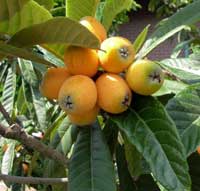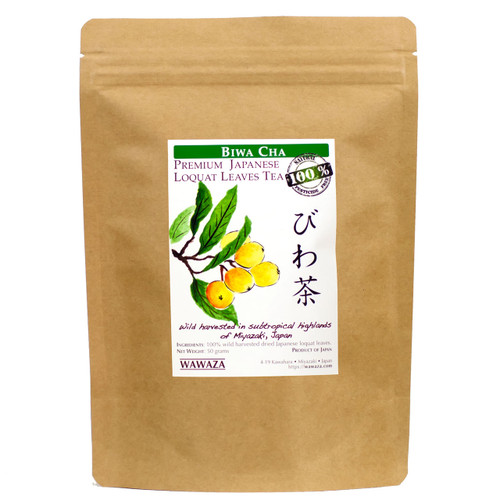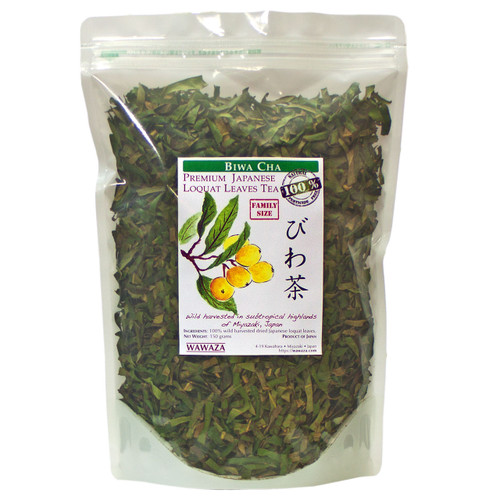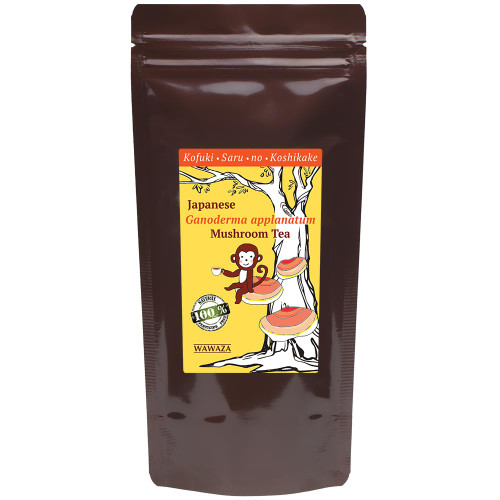This traditional Japanese herbal tea has a mild, earthy taste, subtle hint of sweetness, and beneficial effects in treating numerous diseases. It contains potent antioxidants and polyphenols that can boost general health, improve respiratory ailments, lower blood lipid and sugar levels, and alleviate inflammatory skin conditions such as atopic dermatitis (eczema), among other benefits.
❤ Boost immunity and treat respiratory ailments
❤ Heal skin irritations, redness, and swelling
❤ Decrease blood sugar and combat type 2 diabetes
❤ Lower cholesterol and improve heart health
Easy to prepare (see below). Serve hot, cold or over ice.
Wild-Harvested • All-Natural
Pesticide-free. Prepared from freshly-picked leaves and cut in strips in traditional tanzaku-giri (短冊きり) style for optimal brewing.
Also available in 150g bulk pack.
About Biwa
Biwa, also known as loquat or Japanese medlar, is an evergreen tree native to southern Japan which commonly grows to a height of about 5 meters.
 The flowers are sweetly fragrant. It produces juicy tangerine-color fruits with delicate flesh and pleasantly tart taste. Its long leaves (15-25 cm) are shiny on top with tiny hairs on their undersides.
The flowers are sweetly fragrant. It produces juicy tangerine-color fruits with delicate flesh and pleasantly tart taste. Its long leaves (15-25 cm) are shiny on top with tiny hairs on their undersides.
Biwa leaves are listed for their beneficial properties in the Pharmacopoeia of Japan (Nippon Yakkyoku-hō), the official record of approved herbal remedies published by the Japanese government since 1886.
How to Brew Biwa Cha
Quick Brew Method
The following instructions are for making 4 cups (800 ml total.)
- Add 5 grams (2 heaping tablespoons) of biwa leaves to a pot.
- Add 4 cups of near-boiling water.
- Brew for about 3 minutes.
- Strain and serve hot, cold or over ice.
Senjiru Brew Method
Senjiru is a traditional Japanese technique for yielding a deeper infusion.
- Pour a little more than 4 cups of cold water into a pot.
- Add 2 heaping tablespoons of biwa leaves.
- Heat to a full, rolling boil.
- Turn heat down and simmer for 10 minutes.
- Turn heat off and wait for 10 minutes.
- Strain and serve.
REFERENCES
- Japanese Pharmacopoeia -- 17th Edition. Japan Pharmaceuticals and Medical Devices Agency
- Anti-inflammatory and Antitumor-Promoting Effects of the Triterpene Acids from the Leaves of Eriobotrya japonica -- Biological & Pharmaceutical Bulletin. 2005 Oct;28(10):1995-9.
- Antitumor activity of compounds isolated from leaves of Eriobotrya japonica -- Journal of Agricultural and Food Chemistry. 2002 Apr 10;50(8):2400-3.
- Studies on constituents of triterpene acids from Eriobotrya japonica and their anti-inflammatory and antitussive effects -- Journal of Chinese Pharmaceutical Sciences 38(10):752-757, Oct 2003
- The antitussive, expectorant and anti-asthmatic activities of triterpene acids of loquat leaves in mice and guinea-pigs -- Acta Universitatis Medicinalis Anhui, 2006
- Hypoglycemic effects of sesquiterpene glycosides and polyhydroxylated triterpenoids of Eriobotrya japonica -- Planta Medica 1991, 57(5):414-416
- Tormentic Acid, a Major Component of Suspension Cells of Eriobotrya japonica, Suppresses High-Fat Diet-Induced Diabetes and Hyperlipidemia -- Journal of Agricultural and Food Chemistry, 2014, 62 (44), pp 10717–10726
5 Reviews Hide Reviews Show Reviews
-
Deanna
This was so wonderful and so unexpected. I’m so privileged to have been able to try this. I’m old enough to have been able to see Locos growing locally and this definitely brings back memories. Very happy. I discovered this unexpected delight.
-
Biwa Cha Japanese Loquat Leaves Tea
It is one of my favorite herbal tea! Loquat leaves have been studied. There are scientific validations on the many health benefit of Loquat leaves. Loquat leaves has some anti-inflammatory properties and it helps to control my skin problems. Thank you for your wonderful herbal tea! Customer for life:-)
-
nice
I love having biwa cha every day. And feel better physically.
-
Loquat tea
Very good product. I will keep continue to purchase your products.
-
nice tea
I heard a lot about this from a friend so I ordered one. I don't have any particular problems, but I like herbal teas in general. This is really nice! Somewhat hard to describe its taste, though I would say it's pretty subtle and a little sweet.










